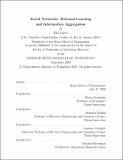Social networks : rational learning and information aggregation
Author(s)
Lobel, Ilan
DownloadFull printable version (1.838Mb)
Other Contributors
Massachusetts Institute of Technology. Operations Research Center.
Advisor
Daron Acemoglu, Munther Dahleh and Asuman Ozdaglar.
Terms of use
Metadata
Show full item recordAbstract
This thesis studies the learning problem of a set of agents connected via a general social network. We address the question of how dispersed information spreads in social networks and whether the information is efficiently aggregated in large societies. The models developed in this thesis allow us to study the learning behavior of rational agents embedded in complex networks. We analyze the perfect Bayesian equilibrium of a dynamic game where each agent sequentially receives a signal about an underlying state of the world, observes the past actions of a stochastically-generated neighborhood of individuals, and chooses one of two possible actions. The stochastic process generating the neighborhoods defines the network topology (social network). We characterize equilibria for arbitrary stochastic and deterministic social networks and characterize the conditions under which there will be asymptotic learning -- that is, the conditions under which, as the social network becomes large, the decisions of the individuals converge (in probability) to the right action. We show that when private beliefs are unbounded (meaning that the implied likelihood ratios are unbounded), there will be asymptotic learning as long as there is some minimal amount of expansion in observations. This result therefore establishes that, with unbounded private beliefs, there will be asymptotic learning in almost all reasonable social networks. Furthermore, we provide bounds on the speed of learning for some common network topologies. We also analyze when learning occurs when the private beliefs are bounded. (cont.) We show that asymptotic learning does not occur in many classes of network topologies, but, surprisingly, it happens in a family of stochastic networks that has infinitely many agents observing the actions of neighbors that are not sufficiently persuasive. Finally, we characterize equilibria in a generalized environment with heterogeneity of preferences and show that, contrary to a nave intuition, greater diversity (heterogeneity) 3 facilitates asymptotic learning when agents observe the full history of past actions. In contrast, we show that heterogeneity of preferences hinders information aggregation when each agent observes only the action of a single neighbor.
Description
Thesis (Ph. D.)--Massachusetts Institute of Technology, Sloan School of Management, Operations Research Center, 2009. This electronic version was submitted by the student author. The certified thesis is available in the Institute Archives and Special Collections. Cataloged from student-submitted PDF version of thesis. Includes bibliographical references (p. 137-140).
Date issued
2009Department
Massachusetts Institute of Technology. Operations Research Center; Sloan School of ManagementPublisher
Massachusetts Institute of Technology
Keywords
Operations Research Center.